#recommended reading!
Explore tagged Tumblr posts
Text
It's not just the Black Keys. Why are so many big tours selling poorly? Stereogum | June 11, 2024 | by Zach Schonfeld
long (and US focused) but still quite interesting article on the current state of concert touring, why tours are getting cancelled or downsized, and what's up with ticket pricing. (my selected excerpts/highlights under the cut)
[excerpt, all highlights mine]
[Eric Renner Brown, a senior editor at Billboard] adds, “I do think [The Black Keys] are an artist that can fill those rooms still. I think the demand is there in terms of people who want to see Black Keys. But perhaps at that price point, the demand was not there.”
Ostensibly, agents and promoters should have access to data that can give them a better sense of demand. But they often place outsized importance on raw streaming numbers.
“The data is very confusing,” says the anonymous booking agent. “There’s a lot of passive listeners for data. You can have millions upon millions of streams, but that doesn’t mean it’s gonna turn into tickets. The opposite is, there are some artists who don’t have many streams at all and they can sell like 2,000, 3,000 tickets.”
[..]
It’s worth noting that the Black Keys have released four albums since returning from hiatus in 2019, and toured arenas as recently as 2022. This may be a case of oversaturating the market.
The band’s 2019 and 2022 arena runs weren’t exactly sold out. In between, the band left their longtime manager in 2021, signing with Irving Azoff and Steve Moir at Full Stop Management. Some sources speculate that Azoff, a former CEO of Ticketmaster, may have encouraged ambitious touring plans. On Thursday, Billboard reported that the group has now parted ways with Azoff and Moir. (The management company did not respond to a request for comment.)
“Essentially, you have some very big managers that are out of touch with the granular finesse and nuance of ticketing,” says another anonymous booking agent. “And they have these large expectations and they tell their agents what they want. And the agents are probably texting each other on the side, going, ‘This man is out of his fucking mind.’ But they do it anyway because, in the case of Black Keys, they’re not gonna challenge Irving Azoff.”
[..]
One contributing factor to instability in the touring industry is the rising cost of… well, everything. It’s part of why ticket prices are so high; it’s also part of the reason some acts are backing out of touring commitments.
Bands at all levels have been sounding the alarm about this for years. In 2022, for instance, Animal Collective canceled European tour dates and explained, “We simply could not make a budget for this tour that did not lose money even if everything went as well as it could.”
Industry insiders say that’s not uncommon. “Everything is ridiculously expensive,” says a tour manager who works with major acts and asked not to be named. “There’s not enough gear for everyone to share, so the vendors are having to pay high amounts for equipment. A single bus for a six-week tour can cost $100,000. Multiple that by multiple buses, and then trucks, and then crews are at a minimum, so they’re getting top rate right now because there’s not enough crews.”
COVID, of course, exacerbated this crunch. “What happened after the pandemic is, everyone was ready to tour at once,” the tour manager says. “There’s not enough gear to cover all of that. A lot of bands have had to cancel tours because they don’t have gear or they couldn’t afford the gear,” the tour manager continued. “I was on a tour with somebody last year where we had to book a private jet because there were no buses available. For the first week of the tour, we had to charter planes.”
Acts are thus incentivized to book bigger venues to recoup the costs of touring. The catch-22 is that bigger venues necessitate more elaborate stage production, which makes for a more expensive tour.
“There’s the expectation to have that production,” says the tour manager. “If people went back to having just two trusses of lights and a P.A. and no frills, it was just about the music, they can afford to tour. But everyone wants to see those flashing lights. Everyone wants to see that video.”
“So much of the economics of these big tours is completely invisible to fans and consumers,” says Kevin Erickson, director of Future of Music Coalition, a nonprofit advocacy group. “You can sell out a tour and come back in the red if there was a cost overrun or a miscalculation.”
For mid-level acts with sizable followings, these frustrations are compounded by a lack of suitable mid-sized venues.
“For a band that maybe has assessed its demand in the market to be in the 8K range or something for capacity, where are they going to go if that sort of venue doesn’t exist?” says Brown. “And if, say, the local theater that seats 3K or 4K can’t accommodate two or three nights, it can only put them for one night on the tour routing. That’s a real concern.”
[..]
At the end of the day, it all comes back to price. The average ticket price for one of the top 100 tours rose from $91.86 to $122.84 between 2019 and 2023. Concerts are too damn expensive, and there’s a growing sense of consumer frustration with shows that cost as much as airline tickets.
-> read the full article here on Stereogum.com
#recommended reading!#this should answer a lot of questions for everyone who were up in arms after the asian tour cancellation last year...#about the current touring climate and costs#streaming numbers ≠ ticket sales#..should not be that big a surprise for industry people and yet..#also that azoff anecdote.. who's surprised lol#touring#music industry#live music#article#stereogum#11.06.24#the black keys#music business#link#m
54 notes
·
View notes
Text

Is this anything
#always an awkward conversation to have irl#“i love ai.” insert that one spongebob holding out his hands with a shadow above him meme#“FICTIONAL. FICTIONAL AI!!!”#clankerposting#Clay posts#fictional ai#shitpost#hal 9000#robots#p03#electric dreams#allied mastercomputer#ihnmaims#shockwave#transformers#fuck ai#this is an anti ai art blog btw#objectum#saying hello to everyone who reads the tags um... hi!! Really funny to read people recommending me entry level robot/AI media#like yes i have indeed heard of portal and ultrakill. i just didnt pit them in the meme </3#also some guy decided to write in the notes that they were going to crush me into red paste. hot? thank you? ???? weird.
29K notes
·
View notes
Text
I'm wondering if, as a society who cares about vulnerable people, we could stop saying "traumatize" when we truly mean "upset"?
I am sick of hearing sad books or movies "traumatize" their readers. I simply do not believe that happens. A traumatic experience might be adjacent to books (I have vivid memories of books I was reading around certain experiences and even how the contents of those books affected my processing of the experiences). But it's not caused by the book. And, y'know. The weather is Christofascist Censorship Attempts outside.
Meanwhile from the other side I continue to be surprised at just how badly people fail to understand trauma and traumatic experiences in general. Watering down the term isn't helping. Find other hyperbole to express that The Bridge to Terebithia gutted you, chewed on your heartstrings, and made you cry your first pair of contact lenses right out of your preteen eyes.
(ETA here although it's impossible to edit reblogs: over the months since this post really took off, there has been valuable discussion in the comments. I stand by the passion with which I wrote this post and with the general message, but not all the exact wording. I talk more about the way I'd re-write this post in a response here, replying to an addition that added a ton of useful context [other additions touched on similar themes, but that person had it all together in one reblog]. With that said, I am muting this post.)
#I know I'm not the first person to say this but#a book cannot put you in visceral fear of your safety or someone else's safety#reading is not a traumatic experience#it may be a triggering experience if you are already traumatized by something else. that is different.#meanwhile actual trauma is not always experienced as consciously upsetting!#people may act extremely chill while being traumatized!#only to then be judged by a peanut gallery on how they handled things#<one reblog recommended not using 'peanut gallery' in the future so I'll amend to say: an audience of uninvolved onlookers#trauma
18K notes
·
View notes
Text

Penelope's final gambit, you will always be famous, no matter the subtext.
#poorly drawn odyssey#the odyssey#odysseus#penelope#epic the musical#Epic's version was very sweet and very well executed (and so cathartic!)#But Odyssey Penelope is *so* done with all the bullshit at this point in the story.#Credit where it is due; at this point she's been through a lot.#And to top if all off - her own son and one of the few maids on her side are buying into this (supposed) ruse.#This cannot have been the only time someone tried to pull this trick on her either.#Its the contrast between: 'Oh you're My husband?' and 'Ohh *sureeee* you're my husband. Just like the 30 other 'Odys' before you.'#The olive tree bed trick is a great gambit because it really is the final test to verify his identity.#I'm just a sucker for couples who have a secret only they know between them I suppose!#The match each other in will and wit! They will always find each other!!!#Anyways. The Odyssey is a worthwhile read and I highly recommend it. Epic is also a great musical worth checking out.
15K notes
·
View notes
Text
Years before the covid pandemic began, author Naomi Kritzer wrote the charming, emotionally genuine short story "So Much Cooking," which was a pandemic log through the eyes of a cooking blog. The premise is that the author is a home cooking blogger raising her kids, and then a pandemic hits--and bit by bit she's feeding not only her own, but her sister's kids, some neighbors' kids, and so on, in a situation of pandemic lockdown and food shortages.
It's very good, and was prescient for a lot of the early days of the covid pandemic. I found myself returning to it often in the first couple of years because of how steadfast it was in its hopefulness.
Last year she wrote a novelette, "The Year Without Sunshine," which attacks a similar problem in a similar way; instead of pandemic, this one is about the aftereffects of a distant nuke or a massive volcano explosion (it doesn't say), which has churned a great deal of dust into the air, causing massive damage to society and agriculture. The story covers one neighborhood, pulling together to keep each other alive--not through violence, but through lawn potatoes and message pinboards and bicycle-powered oxygen concentrators.
I recommend both stories. They're uplifting in a way that a lot of what I see lately isn't. They're a bit of a panacea for constant fearmongering about intracommunity violence and grinding hatefulness. We can be good to each other, if we try.
#writing recommendation#the Year Without a Summer was a real thing in 1816#and if you haven't read about it it's fascinating#but difficult
15K notes
·
View notes
Text
"A story doesn't need a theme in order to be good" I'm only saying this once but a theme isn't some secret coded message an author weaves into a piece so that your English teacher can talk about Death or Family. A theme is a summary of an idea in the work. If the story is "Susan went grocery shopping and saw a weird bird" then it might have themes like 'birds don't belong in grocery stores' or 'nature is interesting and worth paying attention to' or 'small things can be worth hearing about.' Those could be the themes of the work. It doesn't matter if the author intended them or not, because reading is collaborative and the text gets its meaning from the reader (this is what "death of the author" means).
Every work has themes in it, and not just the ones your teachers made you read in high school. Stories that are bad or clearly not intended to have deep messages still have themes. It is inherent in being a story. All stories have themes, even if those themes are shallow, because stories are sentences connected together for the purpose of expressing ideas, and ideas are all that themes are.
#original post#text post#500#1k#2k#btw i know my definition of death of the author is loosey goosey here#it wasn't the main point so i went informal with it! as ppl in the tags have pointed out it isn't exact#and i do recommend reading the wikipedia article or similar (possibly even the essay itself if you're narsty) if you want to learn more!#wasn't expecting this to take off so my apologies to my barthes-heads out there#love you mwah#5k#10k#15k#20k
30K notes
·
View notes
Text

I've seen pieces from this extra comic before, but never read the full thing until today. And holy shit does it hammer home just how much the story is about class.
Multiple times, when food comes up in this comic, it’s also in context of money:
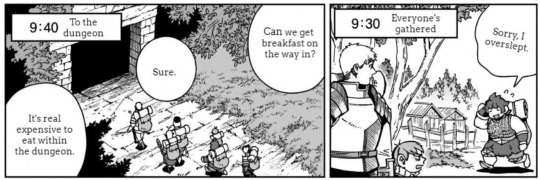
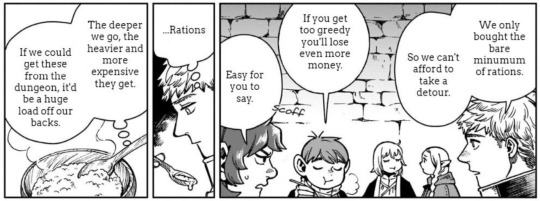
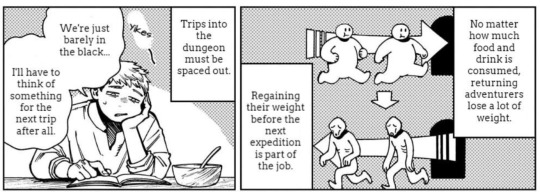
I've seen this last panel on the right brought up before in context of like, dungeon meshi's relationship with fat and eating, but in the full context of the comic it really hits how much adventuring directly consumes bodies for money.
As much as this has been part of the story the whole time, showcased as early chapters 19 and 20...
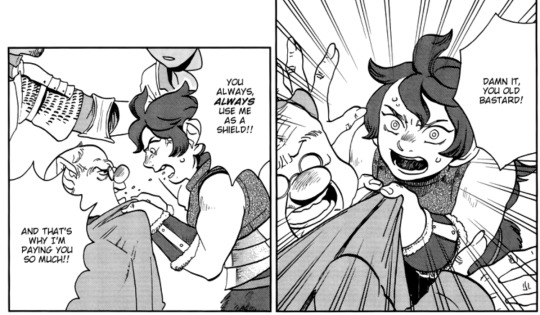
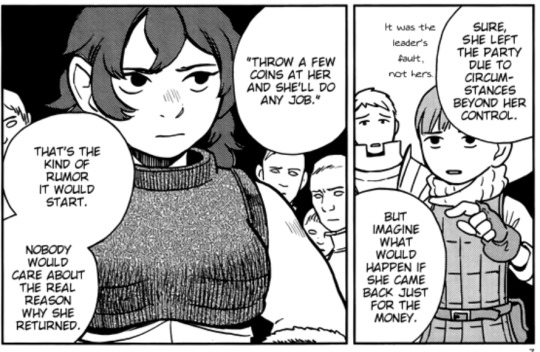
It never fully hit me before how often adventuring comes down to having no other way to make money but to throw yourself into death repeatedly. To be used, whether it’s by individual selfish people (like the resurrection group that is happy to try and get Kabru's group to kill each other to get extra gold from them in chapter 32), or by the greater cog of the Dungeon Economy in general.
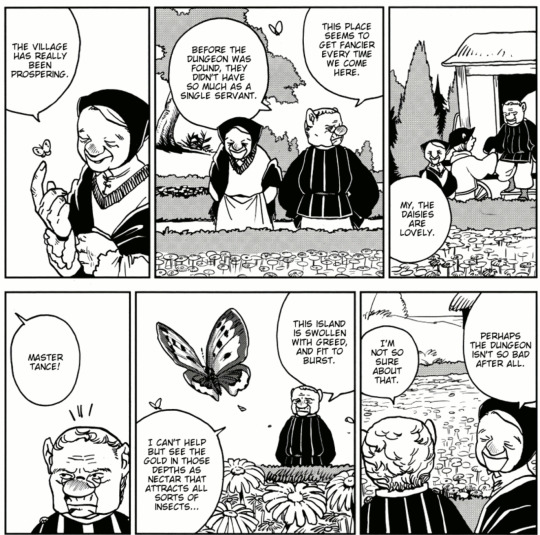
Which, to be clear, is all too often how things work in the real world, too. So many jobs burn through the health and lives of workers. Dungeon Meshi just makes it literal in a new way: by making the healing and resurrection, a core part to the adventuring loop, directly use fat, muscle, and energy from the body being healed.
Imagine Amazon, but if you got injured at work, they could literally burn up some of your body to get you back to working sooner. And that was seen as an advantage of the job.
And then you have Laios, thinking about eating monsters:
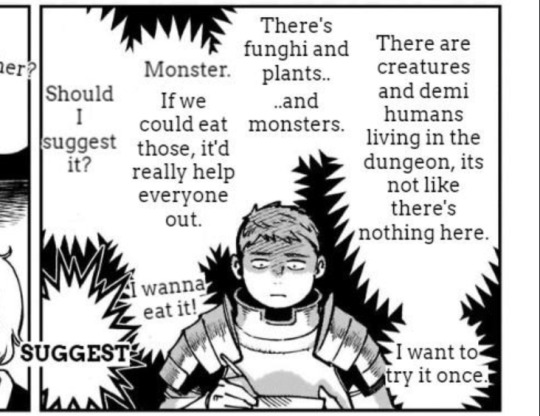
Not just because he likes monsters a lot. But because it would help. He says something similar in the actual manga too, during the chapter discussing his dream with the Winged Lion
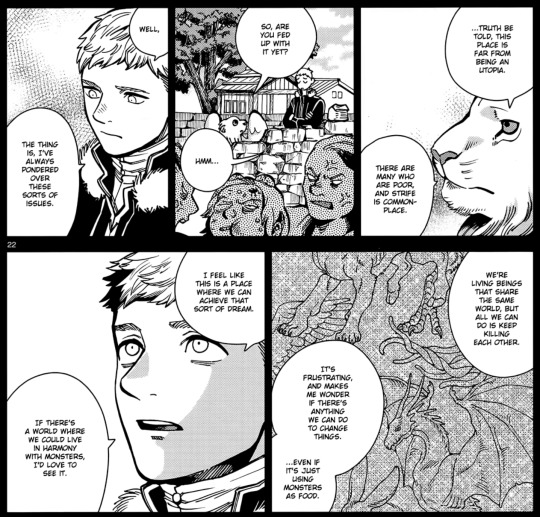
Laios wants to be able to make a home for Falin. He wants to give her a place where she never has to eat alone. And when he gets a party, he wants to give them a way to eat well. And when he runs a country, well…
He wants to ensure that everyone has enough to eat.
Food is political. Food ties into class, and money. What is deemed "proper" to eat, what is a luxury, what is crass… so much of it comes down to money.
Being judged for eating what's available, when what is “proper” isn't affordable, is already a thing that happens. People forced into work that consumes their energy is already a thing that happens.
Dungeon Meshi has a lot of fantastical elements, but boy is its examination of food and class very real.
#dungeon meshi#delicious in dungeon#laios touden#dungeon meshi spoilers#the full thing is up on mangadex and I v much recommend giving it a read#dunmeshi analysis
18K notes
·
View notes
Text

#octavia butler#parable of the sower#la fires#current events#reading recommendations#palisades fire#can confirm
5K notes
·
View notes
Text

(slides u a jon) got time for a draw this in your style?
use #stageturnDTIYS to participate :D
HAVE FUN!!!!! (closeups under the cut :3)

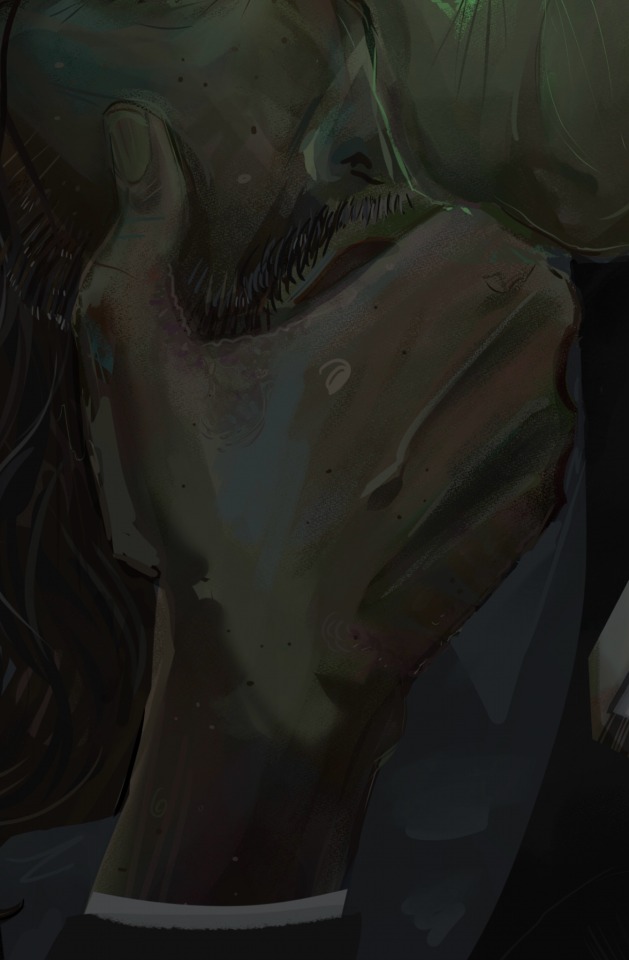

and here's the actual doodle of s1 Jon

#stageturnDTIYS#monarchetype recommended this pose on my last post#everybody say thank u monarchetype#thank u for the kind and silly comments on my last post :) i read and save all of them!!!#hope u have fun and a wonderful day!!! until next i see you#i put a lot of stupid details in this /pos#if youre reading this the tag has morse code on it <3#tma#tma jon#the magnus archives fanart#the magnus archive fanart#the magnus institute#the magnus archives#tma fanart#jonathan sims fanart#jonathan sims#the archivist#dtiys#dtiyschallenge#draw this in your style#tma s4#my art
7K notes
·
View notes
Text
please elaborate in tags :)
#personally i'm actually less likely to look out something if i'm told 'you should read it it's queer'#mostly because if the book was actually interesting they'd have led with that#and it's not a personal recommendation (you'll like this because...) it's just a cookie-cutter stamp#polls#tumblr polls
11K notes
·
View notes
Text

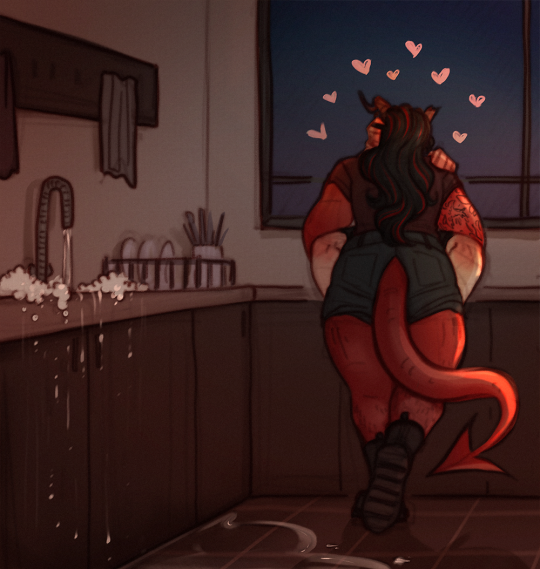
i read legends and lattes recently and now i just think karlach should have a coffee shop
#bg3#baldur's gate 3#shadowlach#shadowheart#karlach#the first one is based on the cover art bc i love it. so much#cANNOT RECOMMEND IT ENOUGH#cosiest book of the year#it scratches such a specific itch in my brain that i didn't know i had#the whole time i was reading it i was like. this would be karlach
8K notes
·
View notes
Text

if we could stay connected, just like this
#ok last orbit niigo post im emubrained again and also i miss leoneed#project sekai#pjsk#prsk#mizuki5 spoilers#proseka#mizuki akiyama#mizu5#nightcord at 25:00#hurray !#meltdown released an amazing translation of the event so i read it and had my final cathartic transgender cry about it#and now i have ~4 assignments due on friday so i have to stop drawing mizuki. sad.#i recommend everyone watch meltdown's translation#please. its very good and better than the mtls floating around#i Get why people wanted to see it translated asap like i Get it i didnt understand half of the wordplay or kanji but like . wah#its so crazy how this event breached containment n how many people are rooting for mizuki even tho they dont play the game so i just#think its a shame that the translation everyones reading isnt really accurate/lacks the nuances.. Ok sorrynits a good event.#ive just been thinking abiut that for a few days and i love talking in tags. Adios#real Orbit heads will know this is an Heartorbit reference (that tarot card sketch i did almost 2 years ago and said i would finish)#(i havent finished shit)
4K notes
·
View notes
Text

Oh hehe that's funny, why is the cover of this book a quarter of an inch shorter than the insid-

4K notes
·
View notes
Text





[insert poetic title here]
fun fact: this did not start out as isat fanart
(rambling in tags)
#I was actually doing some personal writing and when I read it over a few days later I could only hear it in loops voice#speaking of which#i totally recommend watching ShortOneGaming's playthrough of the game#their voices for the characters match so well in my mind i can't separate them XD#also i have no clue why but this took FOREVER#I had the thumbnailing and paneling done so quickly but my motivation to finish it just left me midway through the third page T-T#Even though this is one of the shorter comics I've made (AND NO COLOUR) it somehow took my like twice as long -3-#loop is so fun to draw!#well actually fun to colour would be more accurate lol#also did you know that a keyknife was an actual thing??#I wanted to check if their was an a visual asset of it in the game only to find out they're just everyday objects you can own???#maybe im just seriously out of the loop lol#and i know the buttons are wrong but i was already mostly finished inking by the time i realized so lets just say its a stylistic choice#isat fanart#isat spoilers#sasasaap spoilers#two hats spoilers#cw body horror#??? i think#comic#artists on tumblr#fanart#digital illustration#digital art#isat#isat siffrin#isat loop#in stars and time spoilers#my art#my comic
3K notes
·
View notes
Text
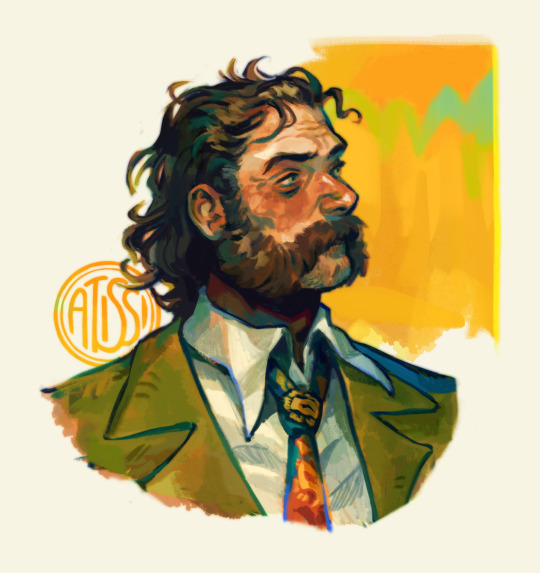
kras mazov lookin ass
#unironically started understanding disco elysium when i started reading more leftist literature. would recommend#i still think the gameplay is kind of a hard sell for most people but ykw. joyce messier as a concept has been immeasurably valuable to me#everytime i talk to my boss and im confused by her politics i think wow....its just like joyce messier#i don't know how you can claim to have all these socialist values and still uphold the capitalist system for your own comfort...WAIT.....#it's just like joyce messier.........#disco elysium#my art
6K notes
·
View notes